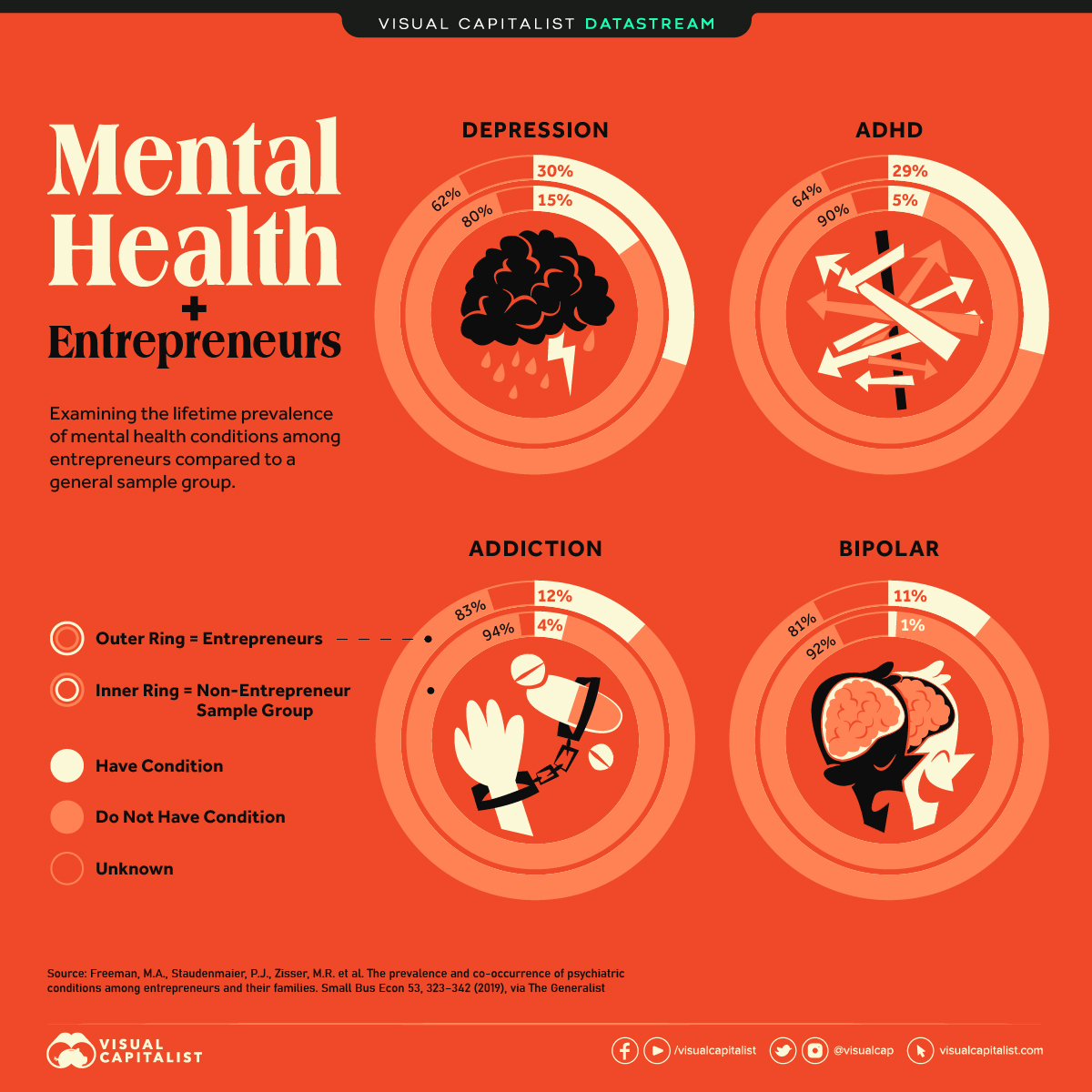
Can I share this graphic?Yes. Visualizations are free to share and post in their original form across the web—even for publishers. Please link back to this page and attribute Visual Capitalist.
When do I need a license?Licenses are required for some commercial uses, translations, or layout modifications. You can even whitelabel our visualizations. Explore your options.
Interested in this piece?Click here to license this visualization.
▼ Use This Visualizationa.bg-showmore-plg-link:hover,a.bg-showmore-plg-link:active,a.bg-showmore-plg-link:focus{color:#0071bb;}
The Briefing
- Prevalence of ADHD, substance use disorders, and mood disorders appears to be higher in entrepreneurs than in the general public
- One-third of entrepreneurs reported two or more co-occurring mental health conditions
The Link Between Entrepreneurship and Mental Health Conditions
Entrepreneurship has long been associated with traits like risk-taking, persistence, and creativity. It’s no surprise, then, many of the world’s most successful companies were brought to life by neurodivergent founders.
Neurodivergence refers to natural differences in brain function among individuals with conditions such as autism, ADHD, dyslexia, and bipolar disorder. As this 2019 study demonstrates, entrepreneurs experience mental health and addiction issues more frequently than the general public, and tend to have families with these illnesses at a higher rate.
Nearly half of entrepreneurs included in the study have one or more mental health conditions. Below the are the numbers for four of the conditions studied.
| Entrepreneurs | General Sample Group | |
|---|---|---|
| ADHD | 29% | 5% |
| Depression | 30% | 15% |
| Bipolar | 11% | 1% |
| Addiction | 12% | 4% |
The research also looked at anxiety, but found that levels were similar between entrepreneurs and the sample group.
Obsessive-compulsive disorder (OCD), dyslexia, and Asperger’s Syndrome, which are not included in this research, are other noteworthy conditions that are sometimes connected with entrepreneurship.
Asperger’s, in particular, is present in a number of successful founders, including Elon Musk and Bill Gates. Peter Thiel, billionaire investor and serial entrepreneur, has argued that this mild version of autism could be an asset in founding successful companies.
An Open Question
There are two competing ideas around the link between entrepreneurship and mental health conditions.
First, some posit that traits associated with mental health conditions (e.g. hyperfocus for ADHD, or attention to detail for Asperger’s) are assets in the startup world.
Secondly, it is also thought that because neurodivergent individuals have more trouble succeeding in conventional frameworks in academia and business, they are more likely to forge their own path by founding companies and pursuing self-employment.
It’s entirely possible that both these ideas are true. The more research that is published around mental health and entrepreneurship, the clearer view we have on the traits associated with creating successful businesses.
The more open the conversation is around mental health, the more we can create conditions in the workplace that empower neurodivergent individuals.
Source: Freeman, M.A., Staudenmaier, P.J., Zisser, M.R. et al. The prevalence and co-occurrence of psychiatric conditions among entrepreneurs and their families. Small Bus Econ 53, 323–342 (2019).
Data notes: Data was analyzed from 76 MBA student and faculty pool participants, 149 psychology students, and 110 entrepreneurs not affiliated with the university. Participants from either recruitment group who reported a history of self-employment or founding or co-founding a for-profit or non-profit business were categorized as entrepreneurs (n = 242).
Hat tip: We discovered this research via The Generalist who published a fantastic post on who becomes an entrepreneur.
The post The Link Between Entrepreneurship and Mental Health Conditions appeared first on Visual Capitalist.